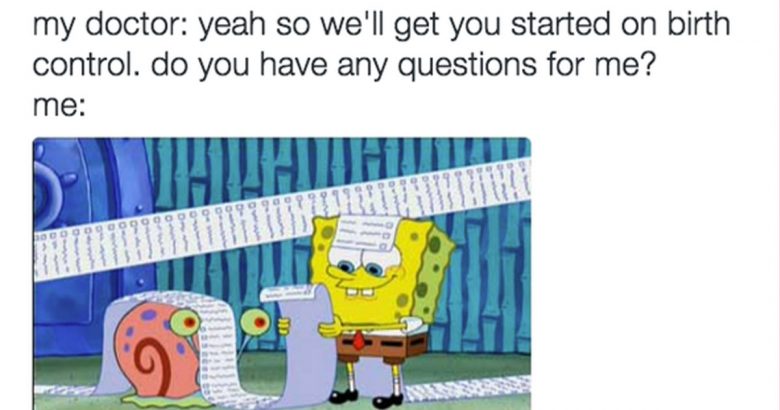
All Of Your Questions About The Birth Control Pill Answered
There’s a lot of confusing information out there when it comes to different types of contraceptive pills and many women experience different reactions.
There’s also a lot of horror stories when it comes to the birth control pill and going on and off it – some women experience greater episodes of depression and even suicidal ideation based on what pill they take. Other women come off the pill and suffer from terrible acne, hair loss, period pain or all of the above, while others may experience little to no side effects on or off the pill.
My own experience with the pill has been relatively smooth all things considered, but it’s not without its ups and downs. I went on the pill for period pain and contraception seven years ago, but after losing a noticeable amount of hair over the years, I decided it was time to come off the pill and let my body do its own thing again. However, I count myself lucky that while being on the pill that it didn’t affect my mood or sex drive too much, because that’s what life is like as a woman these days: you somehow always feel grateful that things weren’t worse.
Coming off the pill hasn’t been without its ups and downs: it’s been nearly four months for me now and my skin has become overly sensitive, meaning I’ve had to strip back my usual routine (goodbye actives, hello CeraVe!). I’ve gone on diets to cut out sugar, dairy, alcohol, and basically anything fun to see if it’d help my gut health bounce back (while taking a shitload of supplements given to me from a naturopath I’ve been working with), and I’m currently stuck in the stage of post-pill amenorrhea, which means I haven’t had a period since coming off the pill.
So knowing that going on the pill and coming off the pill can be a rollercoaster for many, it’s not surprising a lot women often feel confused about the birth control pill and their reproductive health.
From the side effects of coming off the pill to whether the pill really does affect fertility, we talked to endocrinology doctor, Dr. Izzy Smith, about the most commonly asked pill questions.

What potential side effects should women be aware of before coming off the pill?
“There are a few things to consider, listed below:
1. Return of cyclical hormones
We have hormone receptors throughout our entire bodies, including the parts of our brains that regulate emotions. The pill gives a steady dose of estrogen and progesterone, rather than the cyclical ups and downs that are associated with a normal menstrual cycle. For some women, especially those who suffer from PMS or the more severe form pre-menstrual dysthymic disorder (PMDD), this return of fluctuating hormones, especially the drop just before period can result in a low mood or feeling emotional. Also just the change in hormones going on or off the pill can result in some mood lability, but this should improve within a few weeks.
Other common symptoms as women go off the pill can be tender breasts, some spotting before normal menses returns and of course… potential to get pregnant!
2. Increase in testosterone
Women have testosterone too and it’s involved with muscle development, libido and likely some other functions… But it can also increase sebum production in the skin and result in acne and oily skin. This should improve within a couple of months and keeping up normal healthy skincare regimes such as cleansing and exfoliating is important too.
3. Return of hormonally driven conditions
Some women may have been prescribed the pill to help manage symptoms associated with PCOS, endometriosis, or iron deficiency. These conditions will likely still be there and if so, symptoms may return once off the pill. It’s important to talk to your doctor about this and focus on other measures to manage and monitor symptoms.”
Should women be doing anything when it comes to their diet and lifestyle to help counteract side effects?
“Depending on what side effects you’re expecting, yes, but these are also things that are good for our health in general.
For mood fluctuations, exercise can be a wonderful anti-depressant, anti-anxiolytic, and there is even evidence for it improving period cramps. Furthermore, exercise is first-line therapy for PCOS.
There has been some research that showed supplementing with B6 and magnesium eased psychological and physical symptoms of PMS.
Eating a varied and balanced diet with plenty of vegetables, wholegrains, lean protein, and healthy fats is important for our health in general, and especially for our hormonal health. Very low-carb or very low-fat diets are not good for hormone production and eating a balance of nutrient-rich macronutrients is the way to go. There is some weak evidence that dairy may worsen acne, but this won’t be true for all people with acne and if eliminating dairy, it’s important to make sure you’re getting calcium and micronutrients from other sources.”
Can you describe the difference between the pill and the mini pill?
“The pill is a combination of oestrogen and synthetic progesterone and prevents ovulation and results in the steady state of hormones I mentioned above. The pill can help with things like acne and facial hair and decreases the lifetime risk of ovarian cancer by 40%, but does slightly increase the risk of DVTs [deep vein thrombosis] and very slightly increases the risk of breast cancer, but this risk returns to normal once it’s been ceased.
Whereas the mini pill is progesterone only and mainly prevents pregnancy by changing the environment of the vaginal canal and endometrium, so that fertilisation of an egg or implantation of an embryo is unlikely. The mini pill doesn’t help with acne (can actually make acne worse) but doesn’t have the same risks of DVTs, and can be used in breastfeeding. Unless there is a contraindication to the pill e.g. previous DVTS, the mini pill is not generally recommended as first-line for contraception.”
Does the length of time you’re on the pill affect your experience/side effects coming off it?
“From what I can see, there haven’t been any major studies on this, but from a physiological perspective, it shouldn’t. However, if you’d been on the pill for 10 years and forgot what hormonal acne, PMS, or heavy periods were like… you might find the symptoms a bit more confronting or noticeable.”
Does being on the pill long-term affect fertility?
“This is such an important topic to discuss, as there is a lot of misinformation out there about this topic. Although it may take a few months for a normal cycle to return, fertility is not impacted beyond this.
This has recently been confirmed by a meta-analysis of 22 studies and thousands and thousands of women, showing that women who have been on the pill for long periods of time, fall pregnant within a year at the same rate as women who hadn’t been on the pill. A couple of these studies even showed a trend that some women fell pregnant more easily after being on the pill.”
It’s said it can take anywhere up to a year for a woman’s skin/hormones to settle after coming off the pill – why do some women see side-effects even two years later?
“As a hormone specialist, I see a lot of stuff blamed or attributed to the pill when the evidence, physiology, and what I see in clinic, really doesn’t add up…
Acne or hormonal mood swings for years after coming off the pill aren’t side effects from coming off the pill, more that these were likely underlying issues that the pill may have decreased/masked. Also, if someone had been on the pill for many years, it’s possible they developed something like PCOS during that time, which then predisposed to those symptoms once the pill was ceased.
If people are still experiencing breakouts a few months after coming off the pill, it’s good to diagnose what the underlying cause is… Is it PCOS or is it related to certain products you’re using? Seeing a GP with an interest in skin, or if accessible, a dermatologist may be beneficial too.”
For women who no longer want to be on the pill but suffer from things such as PCOS and endo, what is your advice for them?
“Talk to your doctor about what alternative options are and the specific pros and cons of staying on or going off the pill. If you don’t have side effects from the pill and your endometriosis symptoms have improved significantly, but you’re worried about things like the risk of breast cancer (which is actually incredibly small), it might be good to talk to your doctor about your specific concerns and if going off the pill is actually right for you.
If you’re having side effects such as low mood, low libido, suffer from migraines or want to fall pregnant, going off the pill is likely a good idea. Talk to your doctor about why you want to go off the pill and other lifestyle and medical options to manage your condition that fits your individual needs and preference.”
